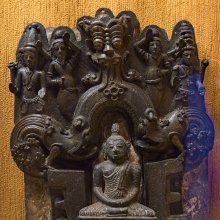Yata, Yāta, Yatā: 16 definitions
Introduction:
Yata means something in Hinduism, Sanskrit, Jainism, Prakrit, Buddhism, Pali, Marathi, Tamil. If you want to know the exact meaning, history, etymology or English translation of this term then check out the descriptions on this page. Add your comment or reference to a book if you want to contribute to this summary article.
Images (photo gallery)
In Hinduism
Purana and Itihasa (epic history)
Source: JatLand: List of Mahabharata people and placesYata (यत) is a name mentioned in the Mahābhārata (cf. XIV.8.16, XIV.8) and represents one of the many proper names used for people and places. Note: The Mahābhārata (mentioning Yata) is a Sanskrit epic poem consisting of 100,000 ślokas (metrical verses) and is over 2000 years old.

The Purana (पुराण, purāṇas) refers to Sanskrit literature preserving ancient India’s vast cultural history, including historical legends, religious ceremonies, various arts and sciences. The eighteen mahapuranas total over 400,000 shlokas (metrical couplets) and date to at least several centuries BCE.
In Jainism
General definition (in Jainism)
Source: The University of Sydney: A study of the Twelve ReflectionsYāta (यात) refers to “going”, according to the 11th century Jñānārṇava, a treatise on Jain Yoga in roughly 2200 Sanskrit verses composed by Śubhacandra.—Accordingly, “Fool, you must understand, in reality, substance is not acknowledged in a mass of foam, the trunk of a plantain tree or in the body of human beings. The planets, moon, sun, stars and seasons go and come (yātāyāta) [but] certainly for embodied souls bodies do not [go and come] even in a dream”.
Synonyms: Gamana, Gata.

Jainism is an Indian religion of Dharma whose doctrine revolves around harmlessness (ahimsa) towards every living being. The two major branches (Digambara and Svetambara) of Jainism stimulate self-control (or, shramana, ‘self-reliance’) and spiritual development through a path of peace for the soul to progess to the ultimate goal.
Languages of India and abroad
Pali-English dictionary
Source: BuddhaSasana: Concise Pali-English Dictionaryyata : (pp. of yameti) checked; controlled; restrained. || yāta (pp. of yāti), gone; proceeded.
Source: Sutta: The Pali Text Society's Pali-English DictionaryYāta, (pp. of yāti) going, gone, proceeded; habit, custom; only in cpd. Yāt’ânuyāyin going on according to what (or as it) has gone, i.e. following old habits J. VI, 309, 310; explained by C. as “pubba-kārinā yātassa puggalassa anuyāyī, paṭhamaṃ karonto yāti nāma pacchā karonto anuyāyati. ” The usual Sk. phrase is gat-ânugatika. Cp. yātrā, yānikata. (Page 552)
— or —
Yata, (pp. of yam) held, checked, controlled, restrained, careful S. II, 15, 50; Sn. 78, 220, 1079 (=yatta, paṭiyatta, gutta etc. Nd2 525); J. VI, 294 (C. appamatta; Kern, Toev. s. v. proposes reading yatta for yata Vism. 201 (?). Esp. in two phrases: yat-atta (yata+attan) selfcontrolled, one whose heart is kept down D. I, 57 (cp. Dial. I. 75); Sn. 216, 490, 723; DA. I, 168.—yata-cārin living in self-restraint, living or behaving carefully Sn. 971 (=yatta paṭiyatta gutta etc. Nd1 498); Miln. 300 (+samāhita-citta, where Kern, Toev. s. v. proposes to read yatta-cārin for yata°). A similar passage at Th. 1, 981 reads yathā-cārin (q. v. for further explanation). ‹-› Cp. saṃyata & see also yatta. (Page 548)

Pali is the language of the Tipiṭaka, which is the sacred canon of Theravāda Buddhism and contains much of the Buddha’s speech. Closeley related to Sanskrit, both languages are used interchangeably between religions.
Marathi-English dictionary
Source: DDSA: The Molesworth Marathi and English Dictionaryyāta (यात) [or याती, yātī].—f (jāti S) Division or distinction among men, caste: also an order or a class, a tribe, a caste. Ex. kōṇayātī kōṇavarṇa ||.
--- OR ---
yāta (यात).—p S Gone. 2 Obtained, gained, got.
Source: DDSA: The Aryabhusan school dictionary, Marathi-Englishyāta (यात) [-tī, -ती].—f Division among men, caste.
--- OR ---
yāta (यात).—p Gone. Obtained.
Marathi is an Indo-European language having over 70 million native speakers people in (predominantly) Maharashtra India. Marathi, like many other Indo-Aryan languages, evolved from early forms of Prakrit, which itself is a subset of Sanskrit, one of the most ancient languages of the world.
Sanskrit dictionary
Source: DDSA: The practical Sanskrit-English dictionaryYata (यत).—p. p. [yam-kta]
1) Restrained, curbed, controlled, subdued; निराशीर्यतचित्तात्मा (nirāśīryatacittātmā) Bhagavadgītā (Bombay) 4.21.
2) Striving, diligent; तांश्चानुसंचार्य ततः कृतार्थाः पतन्ति विप्रेषु यतेषु भूयः (tāṃścānusaṃcārya tataḥ kṛtārthāḥ patanti vipreṣu yateṣu bhūyaḥ) Mahābhārata (Bombay) 12.31.111.
3) Limited, moderate; see यम् (yam).
-tam The spurring of an elephant by means of the rider's feet; Mātaṅga L.
--- OR ---
Yāta (यात).—p. p.
1) Gone, marched, walked.
2) Passed, departed, gone away.
3) Passed by, elapsed.
4) Attained, reduced or gone to (a state &c.). (See yā).
-tam 1 Going, motion; विद्वान् विदामास शनैर्न यातम् (vidvān vidāmāsa śanairna yātam) Śiśupālavadha 3.32; यातं यच्च नितम्बयोर्गुरुतया (yātaṃ yacca nitambayorgurutayā) Ś.2.2.
2) A march.
3) The act of driving an elephant with a goad; Mātaṅga L.8.22.
4) The past time.
Source: Cologne Digital Sanskrit Dictionaries: Shabda-Sagara Sanskrit-English DictionaryYata (यत).—mfn.
(-taḥ-tā-taṃ) 1. Governed, controlled. 2. Limited, restrained. n.
(-taṃ) The stirring of an elephant by means of the rider’s feet. E. yam to check, kta aff.
--- OR ---
Yāta (यात).—mfn.
(-taḥ-tā-taṃ) 1. Gone, went. 2. Obtained, got. n.
(-taṃ) 1. Driving or guiding an elephant with a goad. 2. Going, motion. 3. The pastime. E. yat to endeavour, or yā to go, aff. śa .
Source: Cologne Digital Sanskrit Dictionaries: Cappeller Sanskrit-English DictionaryYata (यत).—[adjective] held, restrained, checked, controlled.
--- OR ---
Yāta (यात).—[adjective] gone, passed, etc.; [neuter] gait, march, motion; (*the place where a person has gone); the past time.
Source: Cologne Digital Sanskrit Dictionaries: Monier-Williams Sanskrit-English Dictionary1) Yata (यत):—a See under √yam, p.845.
2) [from yam] b mfn. restrained, held in, held forth, kept down or limited, subdued, governed, controlled etc., [Ṛg-veda] etc. etc. (cf. [compound] below)
3) [v.s. ...] n. restraint (?) See yataṃ-kara
4) [v.s. ...] the spurring or guiding of an elephant by means of the rider’s feet, [cf. Lexicographers, esp. such as amarasiṃha, halāyudha, hemacandra, etc.]
5) Yāta (यात):—[from yā] a mfn. gone, proceeded, marched (n. also [impersonal or used impersonally]), [Ṛg-veda] etc. etc.
6) [v.s. ...] gone away, fled, escaped, [Mahābhārata; Kāvya literature] etc.
7) [v.s. ...] passed by, elapsed, [Harivaṃśa; Varāha-mihira]
8) [v.s. ...] entered upon, pursued (as a path), [Rāmāyaṇa]
9) [v.s. ...] gone to, come or fallen into ([accusative] [locative case], or [compound]), [Manu-smṛti; Mahābhārata] etc.
10) [v.s. ...] situated (as a heavenly body), [Varāha-mihira’s Bṛhat-saṃhitā]
11) [v.s. ...] become, turned out (kva tad yātam, what has become of this?), [Harivaṃśa]
12) [v.s. ...] known, understood, [Patañjali]
13) [v.s. ...] n. motion, progress, gait, course, drive, [Ṛg-veda] etc. etc.
14) [v.s. ...] the place where a person has gone, [Pāṇini 2-3, 68 [Scholiast or Commentator]]
15) [v.s. ...] the past time (opp. to an-āgatam, the future), [Varāha-mihira’s Bṛhat-saṃhitā]
16) [v.s. ...] the guiding or driving of an elephant with a goad, [cf. Lexicographers, esp. such as amarasiṃha, halāyudha, hemacandra, etc.]
17) b etc. See p. 849, col. 2.
Source: Cologne Digital Sanskrit Dictionaries: Yates Sanskrit-English Dictionary1) Yata (यत):—[(taḥ-tā-taṃ) p.] Restrained.
2) Yāta (यात):—[(taḥ-tā-taṃ) p.] Gone; got. n. Driving an elephant.
Source: DDSA: Paia-sadda-mahannavo; a comprehensive Prakrit Hindi dictionary (S)Yata (यत) in the Sanskrit language is related to the Prakrit words: Jaya, Jāya, Yaṃta.
[Sanskrit to German]
Sanskrit, also spelled संस्कृतम् (saṃskṛtam), is an ancient language of India commonly seen as the grandmother of the Indo-European language family (even English!). Closely allied with Prakrit and Pali, Sanskrit is more exhaustive in both grammar and terms and has the most extensive collection of literature in the world, greatly surpassing its sister-languages Greek and Latin.
Kannada-English dictionary
Source: Alar: Kannada-English corpusYata (ಯತ):—
1) [adjective] lifted up; raised.
2) [adjective] stretched forward; held out.
3) [adjective] controlled; regulated.
4) [adjective] limited; curbed.
--- OR ---
Yata (ಯತ):—
1) [noun] the act of running.
2) [noun] the act of urging an elephant by proding the animal with the feet by its driver.
--- OR ---
Yāta (ಯಾತ):—
1) [noun] the act or process of going up, ascending, climbing.
2) [noun] a manually operated instrument working on the principle of the lever, used for lifting water from below, usu. from a well; a water-lift.
3) [noun] a manually operated instrument having a long beam turning on a pivot and a pounding club at one end used to hull paddy; a paddy-pound.
--- OR ---
Yāta (ಯಾತ):—[adjective] gone forward; moved ahead.
--- OR ---
Yāta (ಯಾತ):—
1) [noun] the act of going, travelling.
2) [noun] the act of urging an elephant move forward by goading.
3) [noun] foot-soldiers collectively, of an army; infantry.
Kannada is a Dravidian language (as opposed to the Indo-European language family) mainly spoken in the southwestern region of India.
Tamil dictionary
Source: DDSA: University of Madras: Tamil LexiconYatā (யதா) adverb < yathā. According as, in the same manner as; எவ்வாறு. [evvaru.] (W.)
Tamil is an ancient language of India from the Dravidian family spoken by roughly 250 million people mainly in southern India and Sri Lanka.
See also (Relevant definitions)
Starts with (+89): Yata-na-uta, Yatabahila, Yatabiya-na, Yatacakti, Yatacetas, Yatachitta, Yatachittatman, Yatacitta, Yatacittatman, Yatacittendriyanala, Yatadya, Yatagir, Yatah, Yatahara, Yataka, Yatakke, Yatakrit, Yatakshasumanobuddhi, Yatalaraya, Yatam.
Ends with (+923): Abadhyata, Abbhuyyata, Abehayata, Abhavashunyata, Abhavasvabhavashunyata, Abhavitavyata, Abhavyata, Abhedyata, Abhibhavaniyata, Abhidheyata, Abhikhyata, Abhimanyata, Abhiprayata, Abhishyata, Abhivadyata, Abhivikhyata, Abhiyata, Abhyakhyata, Abhyarhaniyata, Abhyayata.
Full-text (+415): Yatas, Ayata, Yatavrata, Yatamaithuna, Jaya, Yatahara, Yatagir, Viyatam, Niyatam, Prayata, Niryata, Yatatman, Ayatam, Tatas, Svaryata, Nirayata, Yatasruc, Lokayata, Tena, Samayata.
Relevant text
Search found 143 books and stories containing Yata, Yada, Yadha, Yāta, Yatā, Yatha, Yathaa; (plurals include: Yatas, Yadas, Yadhas, Yātas, Yatās, Yathas, Yathaas). You can also click to the full overview containing English textual excerpts. Below are direct links for the most relevant articles:
Rig Veda (translation and commentary) (by H. H. Wilson)
Chaitanya Bhagavata (by Bhumipati Dāsa)
Verse 2.13.393 < [Chapter 13 - The Deliverance of Jagāi and Mādhāi]
Verse 3.2.368 < [Chapter 2 - Description of the Lord’s Travel Through Bhuvaneśvara and Other Placesto Jagannātha Purī]
Verse 3.8.130 < [Chapter 8 - Mahāprabhu’s Water Sports in Narendra- sarovara]
Gemstones of the Good Dhamma (by Ven. S. Dhammika)
Bhakti-rasamrta-sindhu (by Śrīla Rūpa Gosvāmī)
Verse 4.5.12 < [Part 5 - Anger (raudra-rasa)]
Verse 3.3.83 < [Part 3 - Fraternal Devotion (sakhya-rasa)]
Verse 1.2.233 < [Part 2 - Devotional Service in Practice (sādhana-bhakti)]
Sahitya-kaumudi by Baladeva Vidyabhushana (by Gaurapada Dāsa)
Text 7.130 < [Chapter 7 - Literary Faults]
Text 4.63 < [Chapter 4 - First-rate Poetry]
Text 8.8 < [Chapter 8 - Literary Qualities]
Related products



